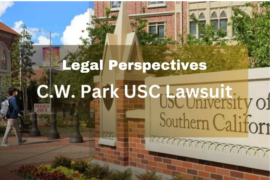Introduction:
The C.W. Park USC lawsuit has gripped headlines, sparking intense debates within the academic community. Filed by Dr. Chan-Wook Park, a former USC professor, this lawsuit alleges discrimination and retaliation. This section provides an overview of the lawsuit and its contentious elements.
Background of the Lawsuit
Overview of Allegations and Controversies
- Dr. Park was abruptly removed as chair of SCA’s film production division in 2016.
- Allegations of racial discrimination and retaliation against USC.
- Sexual harassment accusations against Dr. Park in 2017 sparked investigations.
Title IX Investigation and Legal Action
- USC’s handling of Title IX investigation.
- Dr. Park’s defamation lawsuit against USC in July 2018.
Who is C.W. Park?
Academic Journey and Achievements
- Park’s educational background is in electrical engineering and computer science.
- His tenure at USC, contributions, and achievements despite alleged discrimination.
Racial Discrimination and Harassment Claims
- Park’s claims of racial discrimination affect promotions and career advancement.
- Alleged malicious rumors impacting his professional standing and mental well-being.
Impact of the C.W. Park USC Lawsuit on Higher Education Institutions
The C.W. Park USC Lawsuit has reverberated throughout higher education, shedding light on deep-seated issues within academic institutions. The impact of this case extends far beyond USC, serving as a wake-up call for universities nationwide. It has prompted discussions about the need for comprehensive reforms, emphasizing the importance of creating inclusive environments where discrimination and harassment have no place. The lawsuit’s ripple effect underscores the urgency for universities to proactively address systemic problems, reevaluate policies, and foster cultures of respect and equality.
Discriminatory Practices within USC
- Dr. Elizabeth Daley’s allegations of discriminatory practices within SCA.
- Claims of resistance against diversification efforts and intimidation of female faculty.
Response from USC and C.W. Park
USC’s Stance and Defense
- USC’s statement emphasizes a safe environment and diversity initiatives.
- Disputing the plaintiff’s claims regarding research project concerns.
Dr. C.W. Park’s Denial and Counterarguments
- Park’s denial of all allegations, citing integrity and professionalism.
- Raising doubts about the credibility of the accuser’s claims.
Legal Perspective: Analysis and Possible Outcomes
Title IX and Sexual Harassment
- Examination of Title IX obligations in handling harassment cases.
- USC’s potential liability and legal consequences if found negligent.
Lessons Learned and Institutional Changes
- Importance of transparency and accountability in addressing discrimination.
- Addressing power dynamics and promoting a safe environment for reporting harassment.
A Call for Transparent and Accountable Systems
In the wake of the C.W. Park USC Lawsuit, there is a pressing need for universities to revisit and strengthen their existing policies and procedures. Transparency and accountability must be at the forefront of these revisions. Establishing precise reporting mechanisms, conducting impartial investigations, and ensuring swift and appropriate actions are essential steps forward. Moreover, universities should prioritize education and training programs that promote awareness about diversity, inclusion, and respectful conduct. By implementing these measures, institutions can create a safer and more supportive environment for all members of the academic community.
Encouraging Open Dialogue and Support
The C.W. Park USC Lawsuit highlights the importance of empowering individuals to speak out against discrimination and harassment. Open dialogue and support systems are crucial in ensuring that victims feel heard and validated. Universities must proactively encourage students and faculty to voice their concerns, creating avenues for confidential reporting and counseling services. By fostering a culture of trust and support, academic institutions can provide the necessary encouragement for individuals to come forward, facilitating the eradication of discriminatory practices and promoting a more inclusive educational experience for everyone involved.
FAQS
What is the C.W. Park USC Lawsuit about?
The University of Southern California (USC) is accused of sexual harassment, retaliation, and racial discrimination in the C.W. Park USC lawsuit. Former USC professor Dr. Chan-Wook Park filed the case, alleging he was subjected to discriminatory treatment because of his color and national origin and that multiple female students had accused him of sexual harassment.
What accusations does C.W. Park have against USC, and who is he?
Former USC professor C.W. Park, also known as Chun Woong Park, claims he experienced harassment and discrimination based on his race while working there. He says that because of his ethnicity, USC passed him up for possibilities and promotions. He also complained about suspected prejudice against USC, which prompted several investigations and legal measures.
What effects has the case had on the students at USC?
The lawsuit has damaged USC’s standing and sparked questions about how the school has handled harassment and discrimination claims. Financial uncertainty has also resulted, which could impact students through policy changes or budget cuts. The case has also brought attention to the need for more robust codes of conduct and procedures for reporting instances of sexual misconduct, which will affect how students are treated.
How has USC addressed the claims by C.W. Park and other litigants?
c.w. park usc lawsuit and others have made accusations that USC has vigorously refuted. The institution issued statements reaffirming its dedication to inclusion, diversity, and a safe atmosphere. USC has defended its course of action, claiming that it swiftly resolved any issues brought up through the proper channels. In his defense, Dr. C.W. Park has upheld his professionalism and ethics while refuting all accusations.
What may we infer from the USC lawsuit involving C.W. Park?
The lawsuit emphasizes how crucial it is for academic institutions to be open and accountable and to treat everyone fairly. It emphasizes having explicit policies to deal with misconduct and prejudice. The instance also highlights how important it is to handle power imbalances and foster moral faculty-student relationships. Ultimately, it’s a reminder of how important it is for educational institutions to provide inclusive, courteous, and safe learning environments for all their staff and students.


